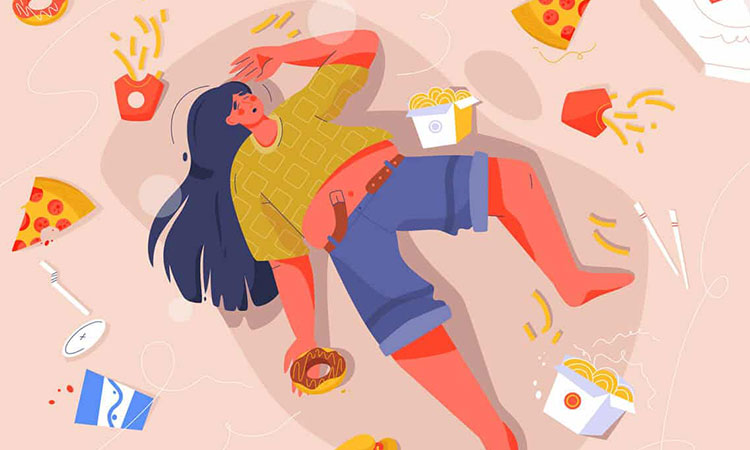
Treatment For Bulimia
At Riverwalk Recovery, we know how to treat bulimia and anorexia. Eating disorders are physical and mental conditions that affect millions of men and women each year. One of the most common disorders is bulimia nervosa, or bulimia. Most people have probably heard of bulimia, but the condition itself is often misunderstood. Fortunately, there are specialists like our team available who understand how to treat bulimia. So what exactly is bulimia, and how can it be treated? Here, we will cover the following:
- What is bulimia
- How can we spot the warning signs
- Common myths about bulimia
- What treatment options are available
What Is Bulimia?
Bulimia nervosa is an eating disorder that functions as a cycle of binge eating and reactionary behavior. This behavior can be anything from induced vomiting to excessive exercise to compensate for excessive food intake. Diagnosis is based on how much food intake occurs in a two hour period, coupled with inappropriate reactionary behavior. The cycle usually has to occur once a week on average over a three-month timeframe for a diagnosis.
Warning Signs Of Bulimia
Some addiction-related medical conditions can be easier to spot than others. Substance use disorders, for instance, can often be spotted by paraphernalia or severe medical distress. Unfortunately, bulimia is not always so easy to notice. Simply put, we all eat food. Moreover, most of us include a variety of foods in our diet and don’t follow a set eating pattern. So how do we know when a loved one may be living with an eating disorder like bulimia? There are both physical and behavioral cues that can give us hints.
Physical Warning Signs
Most physical warning signs of bulimia can only be spotted in groups and over a period of time. In other words, any of these symptoms by themselves do not necessarily indicate a problem. However, if patterns begin to emerge over several months, there could be cause for concern. The most obvious sign is noticeable weight fluctuations, both up and down. Patients may also complain of stomach cramps or other gastrointestinal issues. Dental problems, such as decaying teeth or weak enamel can begin to emerge over time from continued vomiting. Other physical symptoms to look for include:
- Dizziness
- Sleep problems
- Feeling faint often
- Abnormal lab work (thyroid levels, hormones, etc.)
- Thinning hair
- Muscle weakness
Emotional/Behavioral Warning Signs
The physical warning signs above should be considered along with emotional and behavioral red flags. In general, patients with bulimia begin to make matters around food and weight loss their primary concern. Watch for evidence of binge eating, which could include large numbers of food wrappers or empty containers of food. Some patients may try to hide their activities out of shame or fear. Other behavioral signs can include:
- Creating lifestyle rituals to make time for binging and purging
- Withdrawal from family and friends
- Fear of eating around others
- Sudden obsession with fad diets or exercise regimens
- Extreme concern over body image
Common Myths About Bulimia
Eating disorders like bulimia are not well understood by the general public. When people think of bulimia, many imagine that it only affects teenage girls. Still others believe that these conditions are simply moral failings or poor choices. It is important to understand that people of all races, genders, and age groups can and do suffer from bulimia. Approximately one in three people who suffer from these conditions are male. While teenagers are susceptible to bulimia, so are professional athletes, electricians, police officers, and CEOs.
Scientists and medical practitioners are just beginning to understand how bulimia develops. However, there is general agreement that bulimia is a legitimate medical condition. Bulimia is not a moral failure. No one chooses to live with a harmful medical condition. Likewise, no one living with bulimia can simply change their behavior. Medical conditions require medical treatment to properly heal.
How to Treat Bulimia
Bulimia is often spotted and diagnosed by a primary care physician. The severity of each patient’s symptoms will dictate the treatment needed. Treatment generally will address both the physical and psychological trauma caused by the condition. Severe cases involving dehydration or malnourishment may require hospitalization. Many patients may benefit from a Partial Hospitalization or Intensive Outpatient program. These programs focus on clinical care and therapy to help patients develop a healthy relationship with food. During treatment, patients may either go home at night or spend time in a clean living facility.
Help is Here
At Riverwalk Recovery, we know how to treat eating disorders like bulimia. We’ll help you recover in a comfortable setting and treat you with dignity and respect. Contact us here or call us at (423) 624-2600. We accept most major insurance plans. Let us help you live the full life you deserve.
